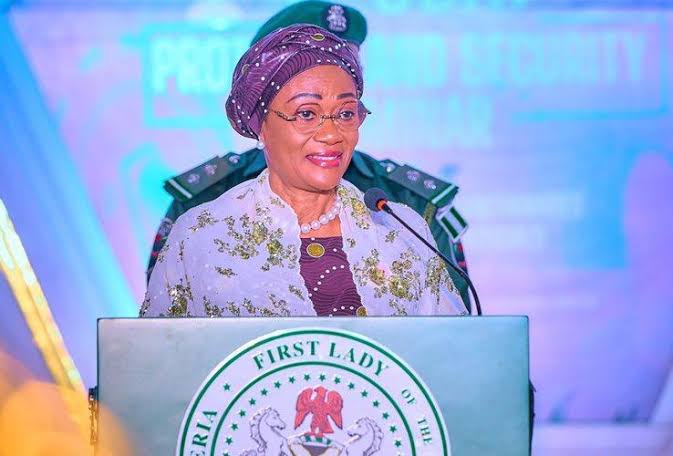Senator Oluremi Tinubu’s Renewed Hope Initiative (RHI), a pet project launched shortly after her husband’s presidential inauguration in May 2023, has made significant strides in philanthropic endeavors, disbursing and pledging a substantial sum of N9.4 billion within its first 16 months of operation. This impressive figure encompasses a diverse array of initiatives, reflecting the RHI’s commitment to addressing various societal needs. Key areas of focus include healthcare improvements, humanitarian relief for displaced populations and victims of natural disasters, support for vulnerable groups such as orphans of fallen military personnel and senior citizens, and empowering women through economic initiatives and educational opportunities. The RHI’s reach extends even to Nigerian diaspora communities, demonstrating a commitment to supporting Nigerians both at home and abroad.
A significant portion of the RHI’s activities revolves around providing financial assistance to individuals and families in need. From distributing N250,000 to each of the 57 families affected by flooding in Abuja to offering N500 million in relief funds to victims of insecurity in Maiduguri, Borno State, the RHI has demonstrated a swift response to crises. Support for the families of fallen military heroes and veterans has also been a priority, with N427.75 million disbursed to widows and orphans, and additional funds allocated to support retired police and military personnel. Furthermore, the RHI has dedicated significant resources to improving the welfare of senior citizens across the nation, allocating N1.9 billion towards their care, along with targeted support in specific states. This highlights the Initiative’s commitment to caring for vulnerable populations and ensuring their well-being.
Beyond immediate relief, the RHI has also invested in long-term empowerment programs, particularly focused on women. These initiatives include a N20 million “Every Home a Garden” contest to encourage female farmers, scholarships worth N4 million each for young women pursuing education, and a digital literacy program equipping women with essential IT skills and resources. Furthermore, the RHI has disbursed grants to female petty traders across various states, as part of a larger plan to bolster the economic independence of women in this sector. This multi-faceted approach signifies the Initiative’s dedication to empowering women through education, skill development, and financial support.
The RHI has also extended its philanthropic reach to address specific health challenges and community needs. Pledging N1 billion annually towards eradicating tuberculosis by 2030, the Initiative has demonstrated its commitment to combating pressing health issues. Further, the RHI has provided financial relief to victims of disasters, such as the N500 million dedicated to supporting flood victims in Borno State and the N100 million distributed to families affected by a tanker explosion in Niger State. Beyond monetary aid, the Initiative has also provided essential supplies, such as food and rice, to communities in need, particularly during festive seasons like Christmas and New Year. This broad scope of intervention underscores the RHI’s responsiveness to diverse societal needs.
The RHI’s influence extends beyond national borders, as demonstrated by the $100,000 donation towards constructing a hospital for Nigerians living in Sierra Leone. This initiative highlights the RHI’s commitment to the welfare of Nigerians in diaspora communities, acknowledging their unique healthcare needs. Furthermore, the RHI has supported educational institutions, providing endowments to empower graduating female students and promoting quality education as a cornerstone of nation-building. This demonstrates a focus on investing in future generations and fostering human capital development.
While the RHI’s extensive activities have garnered praise for their positive impact, they have also sparked inquiries regarding the source of its funding. Given that the office of the First Lady does not receive official government funding, questions have been raised about the Initiative’s financial backing. Senator Tinubu has addressed these concerns, clarifying that the RHI primarily relies on private donations and corporate partnerships, with many donors preferring to remain anonymous. She has highlighted the BUA Group as a significant contributor, particularly in their support of the food bank initiative. This explanation underscores the RHI’s reliance on private sector support to sustain its diverse philanthropic activities.


